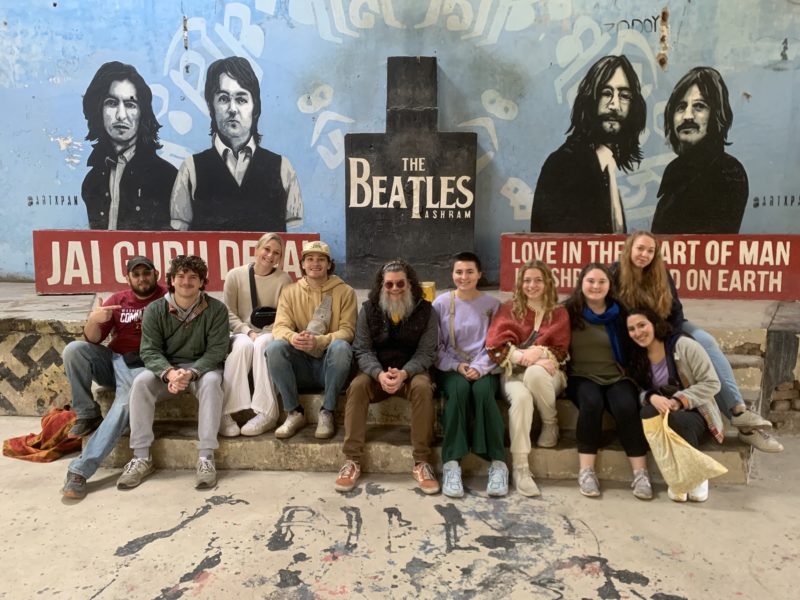
Growing up, two animals scared Madysen Buckley ’23 most: spiders and monkeys. As luck would have it — or not — the international relations and security studies major encountered plenty of the latter during a recent study abroad trip to India.
“Oh boy,” Buckley, who hails from Raleigh, North Carolina, recalled. “When I found out there would be lots of monkeys in India, I was not prepared at all for that reality.”
Along with being accosted by the ubiquitous primates, Buckley — one of eight University of Lynchburg students who went to India over winter break — saw monkeys snatch glasses from people’s faces. One stole a hat from a child’s head; another toppled a parked motorcycle.
“At night, you could hear monkeys running through the streets in groups of at least 15 to 20, and they would scream at the top of their lungs all through the night,” she said. “The ashram we stayed in actually had volunteers who would sit outside all day and night with a stick, simply to scare the monkeys off.”
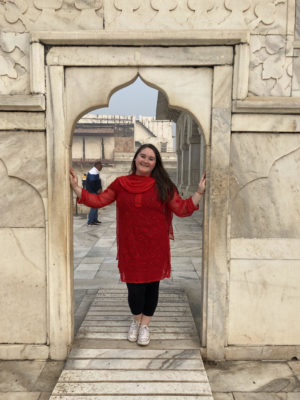
As one might imagine, there’s much more to a study abroad trip in India than fending off monkeys. Over three weeks, the group — led by faculty members Dr. Steve Dawson and Dr. Jamie Brooks — tackled a jam-packed itinerary of cultural and religious sites.
They saw the historic Red Fort, the Taj Mahal, and the place where Mahatma Gandhi was cremated. They visited tombs, gardens, a bird hospital, and what’s known as the “Beatles Ashram,” where the British pop group wrote their “White Album.”
They also went to Muslim mosques, Sufi shrines, and Hindu, Buddhist, Jain, and Sikh temples.
“I have had a longstanding interest — professional and personal — in Indian philosophies and religions,” said Dawson, associate professor of religious studies and philosophy department chair.
“This is something of a cliché, but I remember when I was middle school age — probably eighth grade or so — and I heard the song ‘Within You Without You’ from the Beatles’ ‘Sgt. Pepper’s’ album.
“The sound of those Indian instruments attracted my attention and opened up a new world. I remember later reading about the Beatles’ trip to Rishikesh in 1968 and their encounter with Maharishi Mahesh Yogi.
“So my gateway to Indian philosophies and religions was the Beatles! I suspect I’m not alone in that experience.”
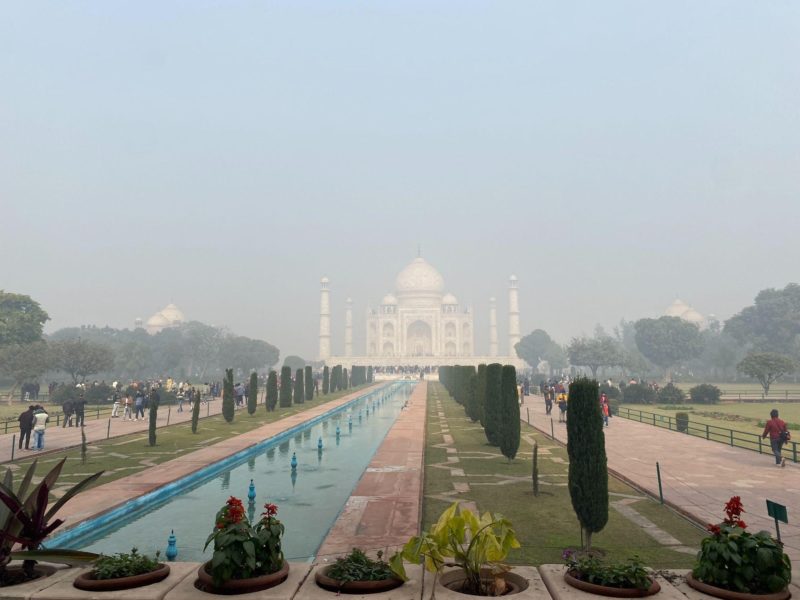
At Gurudwara Bangla Sahib, a Sikh temple in New Delhi, the Lynchburg group helped make bread for the daily meal. Each day, the temple provides a free meal to about 10,000 people, and it’s commonplace for volunteers to help with the cooking.
“One of our most memorable moments was when we were able to assist in cooking behind the scenes at the Sikh temple,” Buckley said. “We were invited to help make paratha, which is a thin bread similar to naan. We sat with a small group of women, where we would roll it out and they taught us how to properly make the bread, which was just amazing.
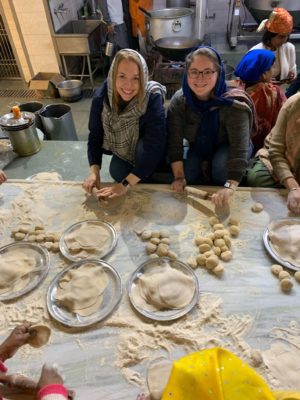
“[The] volunteers — almost all of them — told us that ‘if you do this, you are being blessed by God.’ It really was an eye-opening experience and I could not thank those women and volunteers enough for their time and patience with us, since just about all of us were not the best at rolling out paratha, myself especially.”
Further immersing themselves in Indian culture, the group lodged at two ashrams, or Hindu religious retreats. They spent three nights at Parmarth Niketan, an ashram in the city of Rishikesh.
“It was sort of like a monastery or a college campus,” Dawson explained. “We were staying in the equivalent of dormitories. There was a library there, classrooms, open rooms [with] people studying yoga, as well as different texts or books or whatnot.
“There was a canteen, where we could go to get our meals. The food was vegetarian and well made, but very inexpensive. Part of that is a lot of people who are coming to ashrams are pilgrims.
“Bread with paneer — like cottage cheese — that is what I would get for breakfast every morning. That breakfast and a cup of masala chai was less than two dollars. It was a very filling breakfast, too; it stayed with me.”
At Parmarth Niketan, the group also met with Chidanand Saraswatiji Maharaj, a Hindu leader or swami. For Dawson, it was a highlight of the trip. “We had a 30-minute, private audience with [him] and he invited us afterwards to have lunch in his private dining room,” Dawson said.
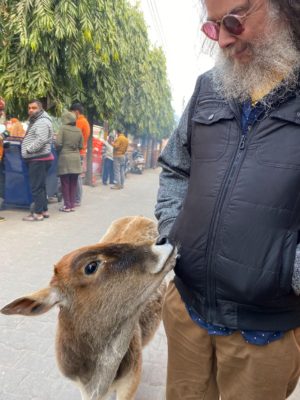
Buckley said the swami gave the group “amazing words of wisdom, which all of us can tell you nearly brought us to tears.” She also described her stay at the ashram as “fun,” noting that she and the others had the opportunity to participate in yoga classes and early morning prayers.
“Even though I’m not religious, the space we were in was … next to the Ganges River,” Buckley said, referring to the sacred Hindu waterway. “I felt a sense of spirituality and lots of energy surrounding us.
“I would go to morning prayer at around four in the morning and after[ward] I would sit and look up at the stars, and eventually see the sunrise over the mountains. It really did feel like a storybook moment and I absolutely loved it.”
While she enjoyed Indian food and culture, Stacy Gallahan ’24 said that — “strangely enough” — her favorite part of the trip might have been the traffic, which she found vastly different than what she sees at home in Lynchburg, Virginia.
“From a Westerner’s view, it seems extremely chaotic,” the international relations and security studies major and Bonner Leader said. “But there is actually an order to it that is mesmerizing — something that you could really only understand if you grew up there or have lived there for a long time.”
Before the trip, the group had a couple of what Dawson described as “pre-departure meetings” to address visas, packing tips, using your cell phone overseas, and other logistical issues. Because students would receive credit for two courses — Comparative Religious Ethics and Global Health — the students also did some research.
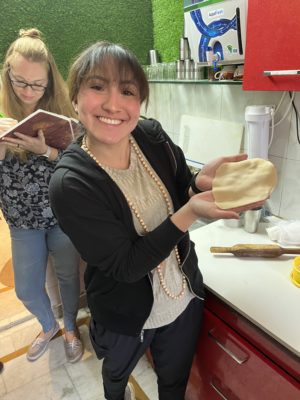
“Before we left, I learned about many different religions and the health status of the country,” Gallahan said. “It helped to draw connections while I was there and gave me surface-level knowledge that I could explore deeper while I was there — versus not knowing beforehand and having to start at the surface level upon arrival.”
Much of what the group learned about Indian cultural and religious traditions, however, was experienced firsthand. “We were lucky to have such an amazing tour guide, named Sury, who taught us how to act and show respect along the way,” Buckley said.
“Lots of customs actually only pertain to certain temples or cities, so doing the research didn’t help as much, as you can only really learn about it when you go to a certain temple or location in India.
“In some temples, we were given food or water to drink. Others, you would ring a bell, and … in some you would place your right hand on the back of your head while you bow and receive a blessing [in] turmeric upon your forehead.
“It all depended on the location, which was confusing, but also super interesting to learn about.”
The cost of the trip, excluding course tuition, was $3,250. To help defray costs, half of the students received need-based grants from Lynchburg’s Shoemaker International Travel Scholarship in amounts of $1,000 to $2,000.
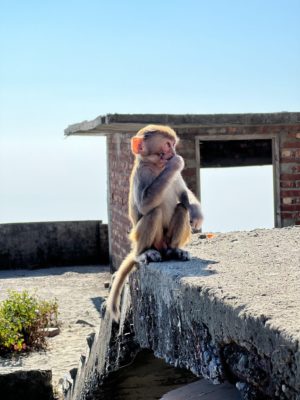
The fund supports “increasing international awareness and opportunities, encouraging international study, and promoting the study of foreign language.”
Gallahan received a $1,500 scholarship, which slashed the cost of her trip nearly in half. “I went to India for three weeks with a full tour guide and many meals included for that price,” she said. “It’s truly amazing. I was going to have to pull out a loan before I knew I got the scholarship.”
Buckley also benefited from the scholarship. “The University has amazing opportunities and resources for financial aid, and the school really wants their students to experience trips like this,” she said.
“So it really did feel heartwarming to know that they provide assistance such as this. In truth, without the scholarships provided, I would most likely not have been able to [go on] the trip, so I’m very grateful to the school for the opportunity.”
Despite her admittedly “chaotic and wild” stories about wildlife encounters, Buckley — who wants to return to India someday — described the trip as including “the most amazing experiences I could have ever had.”
She added, “I would never … change anything about my trip, and I highly encourage anyone considering the trip to just go for it.”

